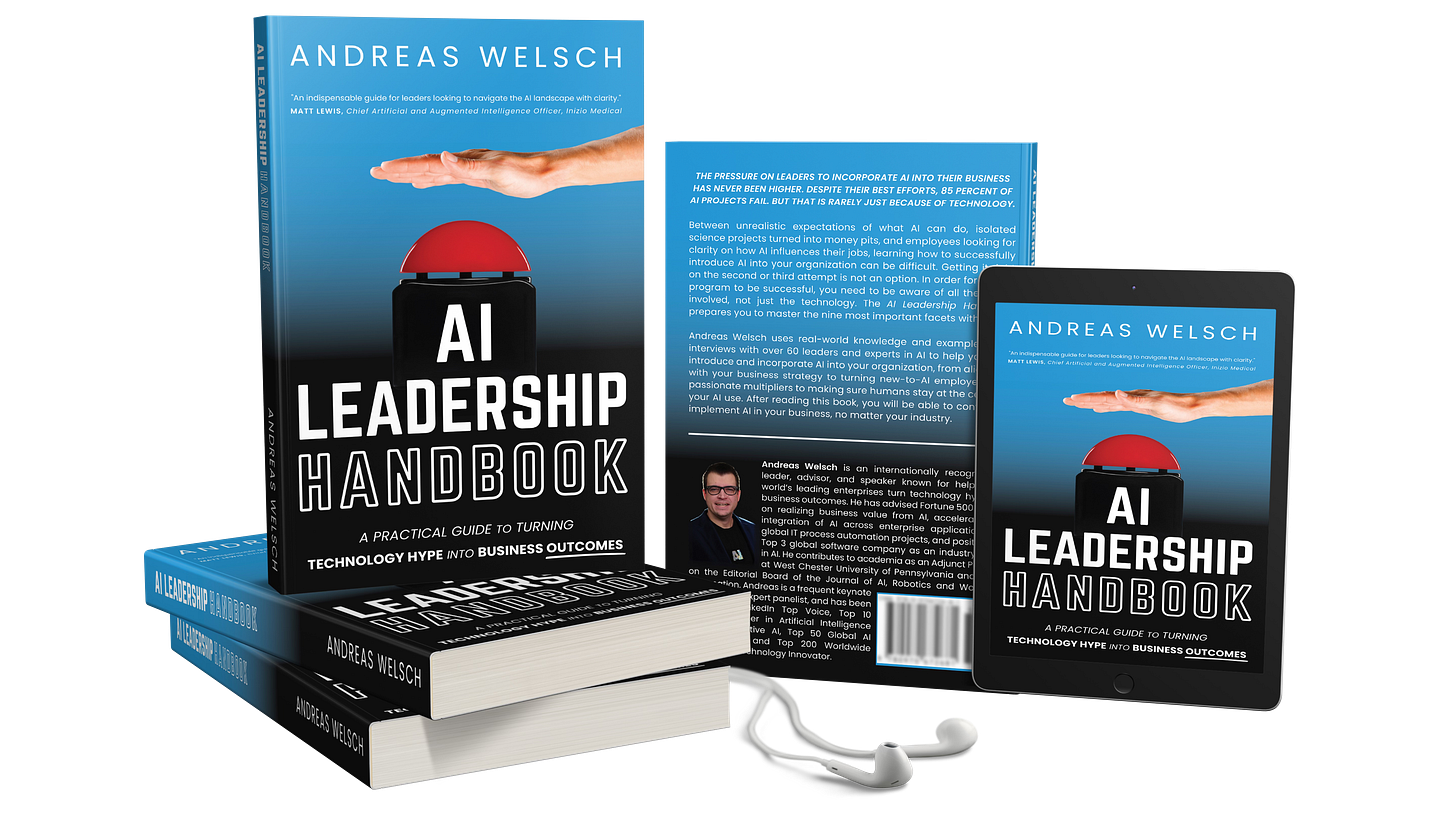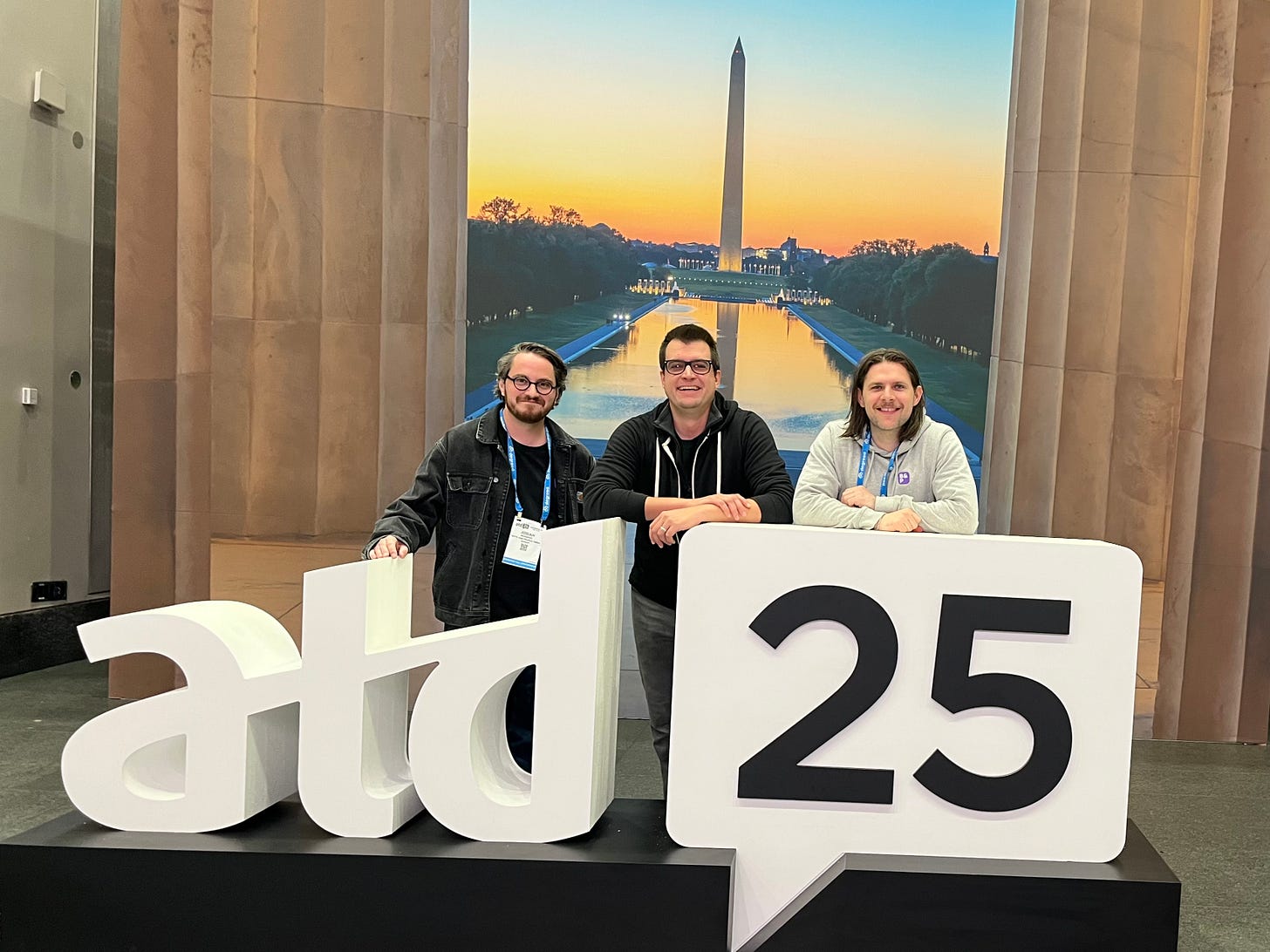Conference Insights: What AI, IT, and HR Leaders Are Really Saying About AI Adoption
The Top Challenges Behind the Rise of AI in Business and How to Overcome Them, Based On Industry Conferences in Philadelphia, Boston, and Washington, D.C.
We are in the middle of conference season. Vendors are putting their latest innovations on display, and superlative-laden press releases and keynote recaps fill our social media feed. But the gap between what could be and what actually is keeps widening.
Over the past three weeks, I’ve attended three industry conferences that brought together leaders with AI, technology, Data, and HR backgrounds. Needless to say, AI was front and center, but every time through a different lens. In this issue, I'll share a snapshot of the dialog and where the opportunities are to advance AI adoption.
Adopting a Holistic Approach for AI Projects
At the beginning of May, Philadelphia was home to Philly Tech Week. DataPhilly hosted a panel discussion on leading AI innovation and business adoption and invited me to moderate it.
The panel combined real-life expertise across sectors like life sciences and financial services, as well as deep technical consulting experience. More than 200 attendees joined the event, including dozens of IT & Data leaders and AI professionals.
In the discussion, we explored AI implementation through different lenses like data privacy and security, responsible AI, culture, etc. From providing hands-on training to building communities of multipliers and raising senior leadership’s awareness of where AI can deliver measurable value, the discussion echoed familiar themes.
What I heard:
How can we ensure that AI systems are fair and inclusive if any and all parts of the population interact with them?
Will AI’s ability to write code make developers obsolete?
What leaders can do:
Look beyond AI as a technology and capture the potential of this technology in the context of society and of your business. Lead the change in how work gets done and where AI can contribute to your business goals.
Technologists have a responsibility to help their stakeholders implement AI responsibly and raise concerns about data privacy and biased outputs that could harm parts of the population.
Listen to the Audiobook: AI Leadership Handbook
Andreas Welsch uses real-world knowledge and examples from interviews with over 60 leaders and experts in AI to help you both introduce and incorporate AI into your organization, from aligning it with your business strategy to turning new-to-AI employees into passionate multipliers to making sure humans stay at the center of your AI use. After listening to this audiobook, you will be able to confidently implement AI in your business, no matter your industry.
Recognizing Data Teams as the Foundation for AI
Next up was Data Summit in Boston. In my keynote in front of 200 attendees, I shared how to “get your business AI ready.” From Heads of Data & Analytics to data governance and data scientists, this event focused on the foundations of AI.
From startups to corporations, CEOs have recently announced layoffs to free up capital for AI investments or pushed their organizations to challenge new hire decisions and instead, try to automate tasks with technology, becoming “AI first”. But to be “AI first,” organizations need to become “AI ready”…first.
For example, 39.4% of employees use AI regularly (NBER, 2024), yet 46% are hesitant to disclose their use to their manager, fearing they will be perceived as lazy or incompetent (Slack, 2024). That speaks volumes about corporate culture. So, it’s not surprising that 31% of employees actively sabotage AI rollouts or don’t use the new capabilities (Writer, 2025).
But getting “AI ready” takes more than a memo. A mix of hands-on training, genuine encouragement to use AI within your team, and, yes, usable data are the fundamentals for fostering AI readiness. Data leaders see the engine room every day, and they know how messy their company’s data can be. While the current investment in organizations is allocated to AI projects, data leaders can position data projects as “Phase 0” of such a project to improve the foundation.
If you’d like to inspire your audience to get the business “AI ready,” reach out for a tailored workshop or session.
What I heard:
While the C-Suite wants employees to use more AI, what that actually means or where to start remains unclear to the workforce.
Individually, professionals use AI for a range of tasks, but they’re also frustrated about the iterative nature of Human + (Generative) AI interaction, pointing to trial and error rather than the availability of structured training.
AI coding assistants are enablers and productivity boosters for building more sophisticated applications faster. It's much less about building entire applications in an afternoon and rather about developing individual modules faster.
What leaders can do:
Communicate clearly why your company wants to pursue AI, how it advances your business, what it means for employees, and how they can prepare for that AI-driven future (e.g., with the company’s help).
Assume that your employees use AI and have been doing so for a while. Look to provide a set of vetted and approved tools. Preventing access to AI assistants on your corporate network will only exacerbate shadow or rogue AI use and put your proprietary data at risk.
Take the next step as well and offer training—but more on that in the next section.
Investing in Upskilling to Support AI Roll-Outs and ROI (Urgently!)
My final stop was the annual conference of the Association for Talent Development in Washington, D.C., with attendees from non-technical roles such as Chief People Officers, Heads of Learning & Development, and Leadership Coaches. I was especially curious about what they would share about the state of training and hands-on learning.
I met with 200 Learning & Development leaders and was pleasantly surprised. Almost all of them shared that they use AI at work. But that was usually just the beginning of the conversation.
The follow-up questions showed a much more differentiated picture: From companies (still) blocking access to AI assistants and leadership adopting a wait-and-see mindset to thinking about where and how to use AI, running limited pilots, and running full-scale roll-outs. For the latter three, training seems like an afterthought of their company’s AI strategy most of the time.
What I heard:
Companies have rolled out AI, but are leaving employees to figure out how to use it.
Upskilling is critical at any part of your company’s AI journey: planning, piloting, and scaling.
This isn’t just training people on a new tool. IT leaders need to involve HR early to change people’s mindset. Conversely, HR leaders should feel empowered to take the initiative and plan AI literacy/ upskilling training instead of waiting for a formal request.
What leaders can do:
For every Dollar you invest in subscriptions, invest two Dollars in upskilling.
Make AI upskilling part of your AI program from the beginning, not just a dreaded checkbox after the roll-out.
And…upskilling doesn’t have to mean clicking through boring, self-paced e-learnings. Make it live & cohort-based, interactive, add gamification. The team at Bots & People helps organizations upskill their workforce on AI. We’ve been working together on AI readiness and leadership trainings for the past year, and I’m really impressed about how gamification and modern approaches increase knowledge retention. Check it out!
Conclusion
AI is clearly front and center in businesses at the moment. But discussion doesn’t mean deployment, and deployment doesn’t mean well-developed. As I walked the expo halls at Data Summit and ATD, there was hardly a vendor that didn’t advertise their AI agents. But: Agents did not come up in conversations with attendees, though. So, we’re still pretty early in that hype cycle right now.
What sticks from these events and conversations:
More AI leaders recognize that it takes more than just technology for AI to succeed. That’s great!
Companies should focus on AI readiness first before chasing an “AI first” approach.
Upskilling is the next critical aspect of successful AI adoption to see a higher ROI—and it is currently undervalued.
While this wraps up the insights from May, there’s more to come in June…
See you at Machine Learning Week in Phoenix, AZ (June 3-4) or at MuleSoft’s Connect AI Day in New York (June 25).
Reach out to finally give your teams the AI training they deserve and unlock the promised productivity spike.
Explore related articles
Become an AI Leader
Join my bi-weekly live stream and podcast for leaders and hands-on practitioners. Each episode features a different guest who shares their AI journey and actionable insights. Learn from your peers how you can lead artificial intelligence, agentic AI, generative AI & automation in business with confidence.
Join us live
May 28 - Barr Moses (CEO & Co-Founder of Monte Carlo) will provide insights into having reliable data for AI and Agentic AI projects.
June 17 - Kathleen Walch (Director of AI Enablement & Community at Product Management Institute) will share the six steps to success for new AI leaders.
June 17 - Kathleen Walch (Director of AI Enablement & Community at Product Management Institute) will share the six steps to success for new AI leaders.
July 01 - John Thompson (AI Leader, Author, and Innovator) will discuss which skills are key when working with AI agents.
Watch the latest episodes or listen to the podcast
Follow me on LinkedIn for daily posts about how you can lead AI in business with confidence. Activate notifications (🔔) and never miss an update.
Together, let’s turn hype into outcome. 👍🏻
—Andreas












